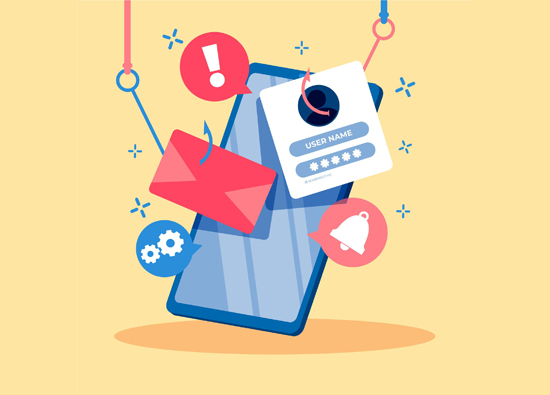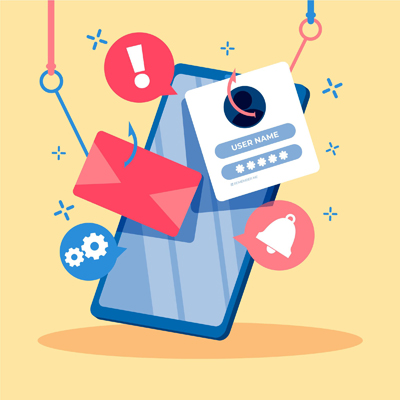04.2025 Life Guide
Why can mobile ads always read your heart?
Far Eastern New Century Corporation / Jian Junru


 Have you ever had the experience of just chatting with a friend about a pair of sports shoes, and soon after it appeared on your phone "chasing you"? Mentioning a certain restaurant today and seeing it on social media the next day? Is this a coincidence, or is there an invisible pair of ears hidden in the phone that can eavesdrop? With the popularization of digital technology, smart devices have penetrated our lives, but they have also opened a backdoor for privacy leakage. This issue of "Information Network" reveals the mystery of mobile phone eavesdropping and teaches you how to protect your personal digital privacy.
Have you ever had the experience of just chatting with a friend about a pair of sports shoes, and soon after it appeared on your phone "chasing you"? Mentioning a certain restaurant today and seeing it on social media the next day? Is this a coincidence, or is there an invisible pair of ears hidden in the phone that can eavesdrop? With the popularization of digital technology, smart devices have penetrated our lives, but they have also opened a backdoor for privacy leakage. This issue of "Information Network" reveals the mystery of mobile phone eavesdropping and teaches you how to protect your personal digital privacy.Is it a mobile assistant or a monitor?
Why do related advertisements immediately appear on mobile phones every time we talk about a certain product? In fact, mobile phones may not necessarily require eavesdropping to predict your needs. Security expert Jake Moore pointed out that every time a user searches, clicks, and swipes, a data trajectory is left behind. After precise algorithm analysis, it can outline an individual's interests, shopping habits, and even predict the products they want to purchase. Technology companies construct a virtual 'digital avatar' through user behavior data, allowing advertisers to accurately grasp the next actions of their target audience.
Voice assistants such as "Hey Siri" or "OK Google" are another type of data collection tool. In order to ensure immediate response to user commands, this type of voice assistant must monitor surrounding sounds for a long time, which poses privacy risks. In 2019, Apple's voice assistant Siri was found to record and archive users' private conversations. Although the official claims that Siri recordings were only used to improve services and that the data had been anonymized, it still raised concerns about data protection among users. As a result, a settlement of USD 95 million was paid to settle the class action lawsuit.
Ultrasonic device tracking technology: invisible monitor
The monitoring methods of modern technology have surpassed human imagination. Have you ever wondered why a smart gas fryer needs to obtain recording permission from a mobile phone? Unreasonable permission requirements imply deep privacy risks. There is now a more covert monitoring method called "ultrasonic cross device tracking technology", which quietly transmits information between various devices through sound waves that cannot be detected by the human ear. Merchants can use the transmitters installed in the store to send special sound signals, and personal phones or laptops become receivers, silently recording the user's every move, from shopping routes, stopped stores, interesting products, to daily life patterns, all of which may be fully recorded. Some Android applications even embed this feature without informing users, in order to track their behavior and accurately advertise.
Five key factors to regain control over privacy
We are not powerless in the face of privacy threats. Here are five action measures to help you regain control over your privacy:
Checking application permissions: When downloading a new application, the first step is to check the permission settings. Many software applications require access to microphones and cameras, but not every application requires these features. Removing unnecessary permissions can effectively reduce the risk of eavesdropping.
Take a break with your voice assistant: If you don't use your voice assistant frequently, we recommend disabling Siri or Google Assistant directly. (In the system settings options of the phone, you can find the method to disable the voice assistant)
Updating your phone is more important than watching TV shows: seemingly ordinary update notifications may be a key step in protecting privacy. Regularly updating mobile operating systems and applications is the most fundamental step in patching known vulnerabilities and resisting new types of attacks.
Lock privacy data: Enabling multiple factor authentication (MFA), such as entering a one-time verification code or using biometric identification, can reduce the risk of account theft.
Don't turn social media platforms into cash machines: Adjust privacy settings on social media platforms such as Facebook and Instagram to minimize public information and avoid personal funds being spread out in the sunshine.
Regulations are digital talismans
In addition to individual actions, regulations are also an important line of defense for protecting personal data. With privacy issues receiving more attention, many countries have begun to strengthen personal data regulations, such as the EU's General Data Protection Regulation (GDPR) and the US's California Consumer Privacy Act (CCPA), which are committed to limiting companies' abuse of personal data and giving users greater control over their own data. Enterprises should also be self disciplined and comply with relevant regulations to avoid incurring expensive fines and reputational damage. Establishing a comprehensive cybersecurity strategy is not only a legal obligation, but also a key factor for enterprises to gain customer trust.
The balance between smart living and privacy
While enjoying the convenience brought by technology, we also need to be vigilant about its impact on privacy. After all, technology should be a tool for serving us, not a shackle for monitoring. The first step in protecting privacy is to raise personal awareness. Let's work together to open our phones now, examine the permissions of various applications, and build a security line for digital life.
*Image source: freepik
#




















